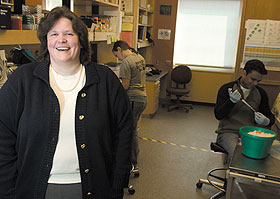  |
| HOME | THIS ISSUE | CALENDAR | GRANTS | BACK ISSUES | < BACK | NEXT > |
Molecular and cell biologist wins career development awardby Cindy Weiss - April 6, 2009
|
||||
| Victoria Robinson, an assistant professor of molecular and cell biology in the College of Liberal Arts and Sciences, has won a $936,000 early career development award from the National Science Foundation (NSF). The CAREER award, as it is known, is the NSF’s most prestigious award in support of the career development of promising teacher-scholars who integrate research and education. The five-year award is for a research project on a bacterial protein known as BipA. Robinson’s research group has uncovered a link between BipA and a “magic spot” molecule in bacteria that was discovered 30 years ago. Their hypothesis is that increasing the levels of this molecule influences BipA’s activity, causing the bacteria to put its energy into surviving stressful conditions such as those encountered during infection. With the grant, Robinson and her group will seek to determine exactly how BipA functions in the cell. This would increase understanding of the bacteria’s ability to infect a host, and of bacterial infections such as those caused by Salmonella or MSRA Staphylococcus, which are highly resistant to current drug therapy. Robinson came to UConn in 2004 from a Howard Hughes Medical Institute laboratory at the Robert Wood Johnson Medical School at Rutgers, where she was a post-doctoral associate. She earned her Ph.D. in biochemistry and structural biology from the University of Iowa, her master’s degree in chemistry from Villanova University, and her bachelor’s degree in biochemistry from Trinity College, Hartford. She is part of UConn’s structural biology partnership, which brings together Health Center and Storrs biologists for research and training. Her specialty is protein crystallography. Robinson’s current research group consists of a post-doctoral associate and three graduate students. She has also mentored 14 undergraduate research students, including a University Scholar.
|
| ADVANCE HOME UCONN HOME |

